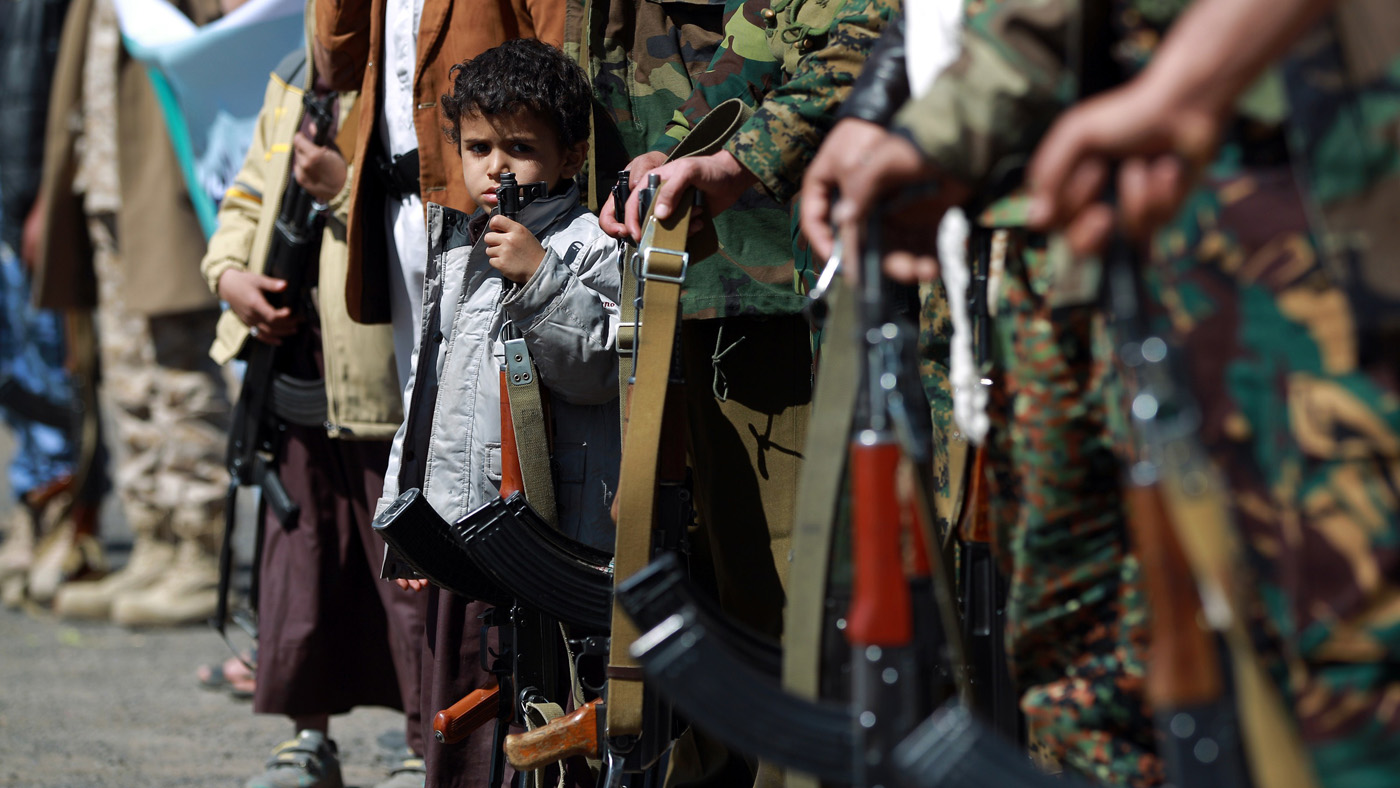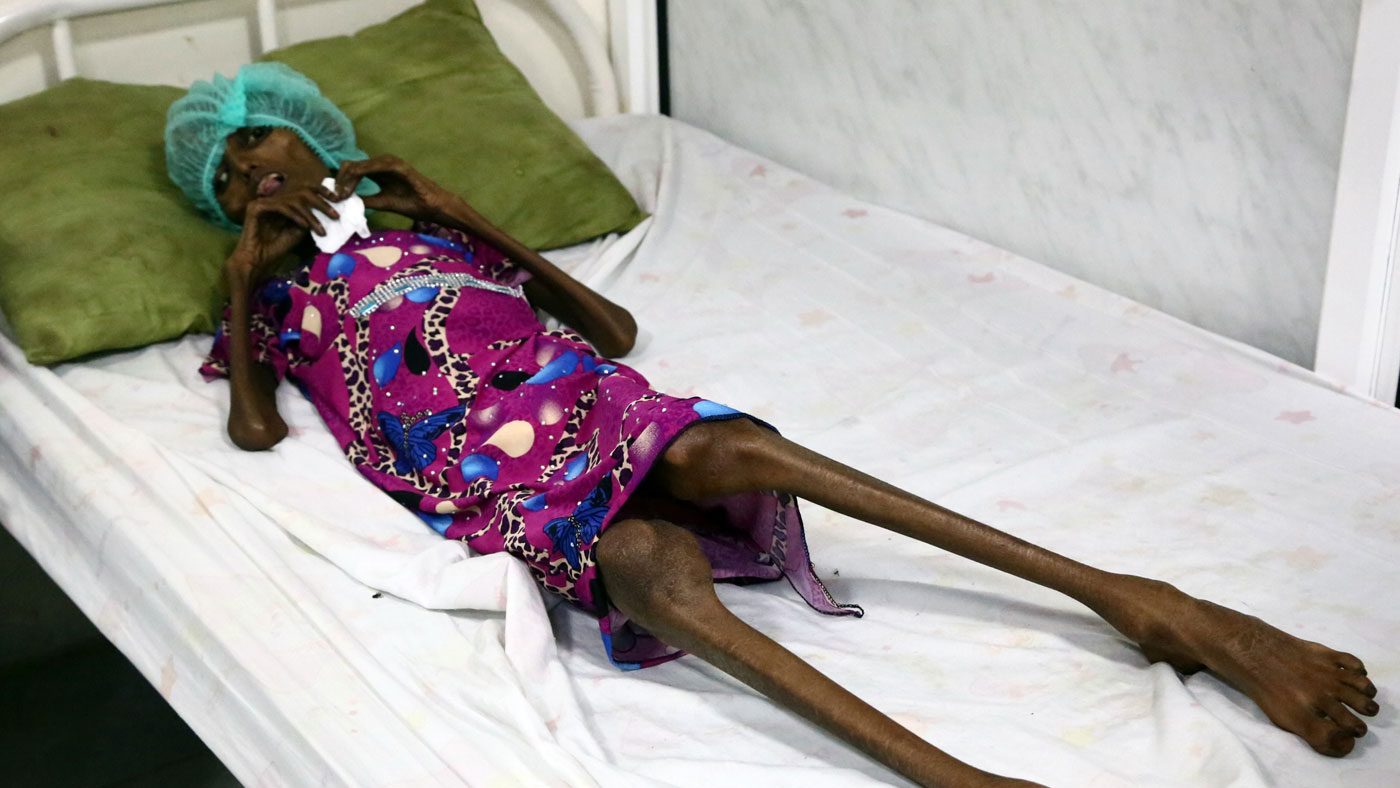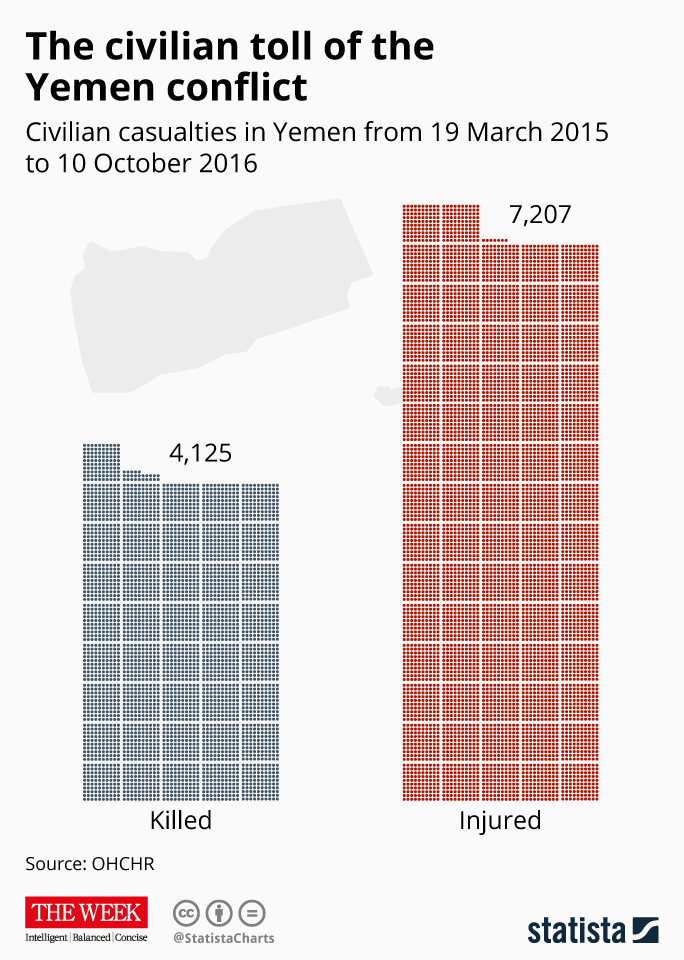Yemeni government rejects US ceasefire
Exiled foreign minister says deal represents a 'desire to scuttle peace efforts'

A free daily email with the biggest news stories of the day – and the best features from TheWeek.com
You are now subscribed
Your newsletter sign-up was successful
The US has announced a tentative ceasefire between the armed Houthi rebels currently in control of Yemen and a Saudi-led military alliance, only for the Yemeni government-in-exile to reject it.
Speaking to reporters at the close of talks in Abu Dhabi on Tuesday, the US Secretary of State John Kerry said all parties had agreed to cease hostilities on 17 November, with the aim of setting up a national unity government before the end of the year.
Kerry, in what could be his last official trip to the Gulf, "is seeking a breakthrough" as Washington "presses for an end to the war before President Barack Obama leaves office", says Reuters.
The Week
Escape your echo chamber. Get the facts behind the news, plus analysis from multiple perspectives.

Sign up for The Week's Free Newsletters
From our morning news briefing to a weekly Good News Newsletter, get the best of The Week delivered directly to your inbox.
From our morning news briefing to a weekly Good News Newsletter, get the best of The Week delivered directly to your inbox.
Hours after the announcement, Yemen's exiled foreign minister Abdel-Malek al-Mekhlafi said his government was not aware of, or interested in, a ceasefire "which represents a desire to scuttle peace efforts by trying to reach an agreement with the Houthis apart from the government".
The internationally recognised Yemeni government, which says it had been "bypassed", may have little choice but to accept Kerry's plan, however, "if leaned on by Saudi Arabia, on which it depends both militarily and financially", says Reuters.
A vicious civil war has divided the nation since March 2015, when, under the pretence of putting an end to corruption and ridding the country of Islamist militants, Iranian-backed Shi'ite Houthi rebels took over the capital Sanaa and forced the Sunni government into exile.
That prompted a Saudi-led coalition to begin the bombing campaign and naval blockade that has left at least 10,000 dead, 35,000 injured and nearly half of the 28 million-strong population in need of food aid, according to the UN.
A free daily email with the biggest news stories of the day – and the best features from TheWeek.com
The UK and other Western countries have been criticised for continuing to sell Saudi Arabia weapons "which monitors say end up destined for use in the Yemeni war", says The Independent, in violation of international law.
Millions starving in 'forgotten war' of Yemen
27 October
Millions of people in Yemen are starving in a "forgotten war", the United Nations warns.
"An entire generation could be crippled by hunger," Torben Due, the director of the UN's World Food Programme, said, with more than 14 million people going hungry and half of them starving.
At least ten of the country's 21 provinces are close to a famine, he added.
The suffering is largely the result of a bombing campaign and blockade waged by a Saudi Arabian-led coalition, reports The Times.
For the last 18 months, the Gulf alliance has been trying to flush out the Iranian-backed Houthi rebels who seized control after ousting former president Abdrabbuh Mansour Hadi last spring.
Around 10,000 people, a third of them civilians, have been killed in the conflict and 21 million people have been left reliant on aid. The health ministry announced it had run out of funds last month and with shipments being stopped by the Saudi-led alliance, Yemen is now receiving just 30 per cent of its needs, says the UN.
"Hunger is increasing every day and people have exhausted all their survival strategies. Millions of people cannot survive without external assistance," said Muhannad Hadi, the Middle East head of the World Food Programme.
Images of an emaciated teenager in the Red Sea city of Hodeida have been shared online. Saida Ahmad Baghili, 18, was admitted to hospital on Saturday with severe malnutrition. A photographer said many people in the country looked like "skin on skeletons".

The conflict has been described as the "forgotten war" by charities. "Much of the world has ignored this raging conflict and heard little about its devastating consequences," says Amnesty International.
Yemen conflict: US launches missiles after rebels target navy destroyer
13 October
The US has launched a series of strikes against Houthi-controlled targets in Yemen after one of its navy warships was repeatedly attacked while navigating the Bab el-Mandeb waterway between Yemen and east Africa.
It marks Washington's first active involvement in the Saudi Arabian-led intervention in Yemen. The attacks, which Pentagon spokesman Peter Cook described as a series of "limited self-defence strikes", were understood to have been authorised by President Barack Obama directly.
Officials say the USS Mason, a navy destroyer, was targeted with two failed missile attacks over the past four days. The US believes Houthi forces in Yemen are backed by Iran.
A statement said: "Earlier this evening (9pm EDT / 4am local time in Yemen), the destroyer USS Nitze launched Tomahawk cruise missiles targeting three coastal radar sites in in Yemen along the Red Sea coast, north of the Bab-el-Mandeb strait. Initial assessments indicate that all three targets were destroyed."
The US currently supports the Saudi-led air strikes against the Houthi movement, which controls large parts of the west of Yemen, including its coast on the Red Sea.
However, earlier this week Washington said it would review its support of Saudi intervention in Yemen to "better align with US principles, values and interests" after an air strike killed at least 140 people at a funeral service in the capital. Responsibility for the attack has not yet been acknowledged by the Saudi government.
According to The Guardian, the strikes "left many in Washington wondering if the US would be drawn deeper into the conflict".

Infographic by www.statista.com for TheWeek.co.uk.
'Dozens killed' in US air strike on al-Qaeda camp
23 March
US war planes have killed dozens of al-Qaeda in the Arab Peninsula (AQAP) fighters in an air strike on a training camp in Yemen, according to the Pentagon.
This is the second such mass-casualty strike the US has carried out this month, says The Guardian. It has not been made clear if there were any civilians among the casualties.
The Yemen-based faction of the terrorist group, which claimed responsibility for the Charlie Hebdo attacks in Paris last year, is considered to be the most dangerous branch of al-Qaeda.
The Pentagon said the strike "deals a blow to AQAP's ability to use Yemen as a base for attacks that threaten US persons and it demonstrates our commitment to defeating al-Qaeda and denying it safe haven".
The conflict in Yemen began as a domestic power struggle between incumbent president Abd Rabbu Mansour Hadi and his predominantly Shia Houthi militia in 2014, but has since escalated into a proxy war between a Saudi-led coalition and Iran.
The civil war has allowed AQAP militants to gain a foothold in the country, says the BBC. "Resurgent al-Qaeda militants have seized territory and infrastructure - indirectly assisted by Saudi-led air strikes on the rebel Houthi movement, their Shia Muslim foes."
More than 6,000 people have been killed since March last year, half of them civilians. Human rights groups are calling on the US, Britain and France to stop supplying weapons to Saudi Arabia that could be used in the conflict.
Yemen crisis: Qatari troops join fight against Houthi rebels
08 September
Qatar has deployed troops to Yemen for the first time, bringing the total number of coalition troops in the country to 10,000 and marking another escalation in the ongoing conflict.
The ground troops, reportedly numbering 1,000 and backed by armoured vehicles and helicopters, will join Saudi-led coalition forces fighting Houthi rebels in the oil-rich province of Marib.
It comes after 60 soldiers from the United Arab Emirates, Saudi Arabia and Bahrain were killed in a rebel air strike, the heaviest loss the coalition has suffered since the conflict began.
The attack and new deployments "may herald a turning point in the conflict as countries appear to be committing to a ground war they had so far avoided," says Reuters.
Coalition air-strikes have intensified since the attack and the Emirati government has vowed to avenge the killings, Al Jazeera reports. "Our revenge shall not take long," local media quoted Abu Dhabi Crown Prince Sheikh Mohammed bin Zayed. "We will press ahead until we purge Yemen of the scum."
Yemen descended into chaos when the Houthis captured Sanaa and forced ousted President Abed Rabbo Mansour Hadi into exile in March. They have since expanded their control of the country, fighting against southern militiamen loyal to the government.
The Saudi-led coalition launched its own military offensive against the rebels shortly after Sanaa fell, with the aim of restoring Hadi's government to power. Riyadh's involvement also forms part of a wider regional power struggle with Iran, which is reportedly backing the rebels.
Since then, the UN estimates that at least 4,500 people - including 2,110 civilians – have been killed as a result of the fighting. It warns that the country is on the brink of famine, with millions of people at risk of starvation.
-
 The ‘ravenous’ demand for Cornish minerals
The ‘ravenous’ demand for Cornish mineralsUnder the Radar Growing need for critical minerals to power tech has intensified ‘appetite’ for lithium, which could be a ‘huge boon’ for local economy
-
 Why are election experts taking Trump’s midterm threats seriously?
Why are election experts taking Trump’s midterm threats seriously?IN THE SPOTLIGHT As the president muses about polling place deployments and a centralized electoral system aimed at one-party control, lawmakers are taking this administration at its word
-
 ‘Restaurateurs have become millionaires’
‘Restaurateurs have become millionaires’Instant Opinion Opinion, comment and editorials of the day
-
 Epstein files topple law CEO, roil UK government
Epstein files topple law CEO, roil UK governmentSpeed Read Peter Mandelson, Britain’s former ambassador to the US, is caught up in the scandal
-
 Iran and US prepare to meet after skirmishes
Iran and US prepare to meet after skirmishesSpeed Read The incident comes amid heightened tensions in the Middle East
-
 Israel retrieves final hostage’s body from Gaza
Israel retrieves final hostage’s body from GazaSpeed Read The 24-year-old police officer was killed during the initial Hamas attack
-
 China’s Xi targets top general in growing purge
China’s Xi targets top general in growing purgeSpeed Read Zhang Youxia is being investigated over ‘grave violations’ of the law
-
 Panama and Canada are negotiating over a crucial copper mine
Panama and Canada are negotiating over a crucial copper mineIn the Spotlight Panama is set to make a final decision on the mine this summer
-
 Why Greenland’s natural resources are nearly impossible to mine
Why Greenland’s natural resources are nearly impossible to mineThe Explainer The country’s natural landscape makes the task extremely difficult
-
 Iran cuts internet as protests escalate
Iran cuts internet as protests escalateSpeed Reada Government buildings across the country have been set on fire
-
 US nabs ‘shadow’ tanker claimed by Russia
US nabs ‘shadow’ tanker claimed by RussiaSpeed Read The ship was one of two vessels seized by the US military